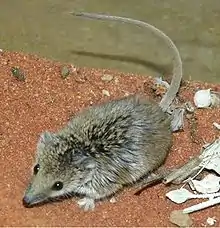Planigale
The genus Planigale are small carnivorous marsupials found in Australia and New Guinea. It is the only genus in the tribe Planigalini of the subfamily Sminthopsinae. The genus has long been known to contain several cryptic species. Of the five Planigale species currently recognized, two (P. ingrami and P. maculata) are known species complexes.[1]
| Planigales | |
|---|---|
 | |
| Common planigales | |
| Scientific classification | |
| Domain: | Eukaryota |
| Kingdom: | Animalia |
| Phylum: | Chordata |
| Class: | Mammalia |
| Infraclass: | Marsupialia |
| Order: | Dasyuromorphia |
| Family: | Dasyuridae |
| Subfamily: | Sminthopsinae |
| Tribe: | Planigalini Archer, 1982 |
| Genus: | Planigale Troughton, 1928 |
| Type species | |
| Planigale brunneus | |
| Species | |
| |
The seven species currently recognized are:
- Paucident planigale, Planigale gilesi
- Long-tailed planigale, Planigale ingrami
- Common planigale, Planigale maculata
- New Guinean planigale, Planigale novaeguineae
- Narrow-nosed planigale, Planigale tenuirostris
- Orange-headed Pilbara planigale, Planigale kendricki[1]
- Cracking-clay Pilbara planigale, Planigale tealei[1]
Species identification

Planigales are the smallest of all marsupials, some members of this carnivorous group weighing less than 5 grams. Being small, nocturnal and secretive, they are rarely seen; however, they are generally common in many parts of the arid interior of Western Australia. Their small size and cryptic nature make the various species difficult to tell apart, with head length and shape, body weight, footpad shape and granulation, fur colour, location, and habitat all being important aids to live identification.[1] The Western Australian Museum has taken a series of footpad photos to aid in identification of Planigale species.[2]
References
- UMBRELLO, LINETTE S.; COOPER, NORAH K.; ADAMS, MARK; TRAVOUILLON, KENNY J.; BAKER, ANDREW M.; WESTERMAN, MIKE; APLIN, KEN P. (2023-08-14). "Hiding in plain sight: two new species of diminutive marsupial (Dasyuridae: Planigale) from the Pilbara, Australia". Zootaxa. 5330 (1): 1–46. doi:10.11646/zootaxa.5330.1.1. ISSN 1175-5334.
- "Planigales | Western Australian Museum".
- Groves, C. P. (2005). Wilson, D. E.; Reeder, D. M. (eds.). Mammal Species of the World: A Taxonomic and Geographic Reference (3rd ed.). Baltimore: Johns Hopkins University Press. pp. 36–37. ISBN 0-801-88221-4. OCLC 62265494.